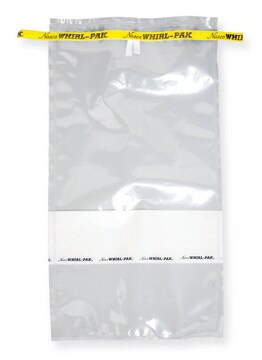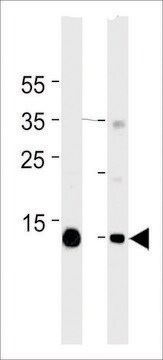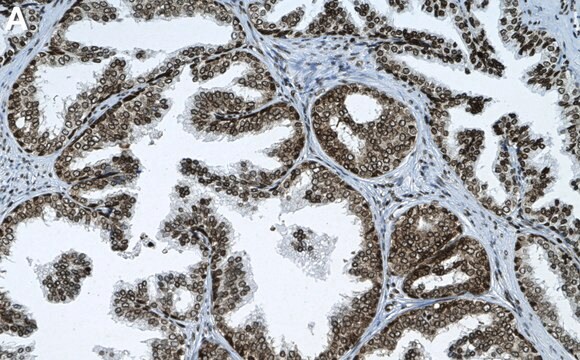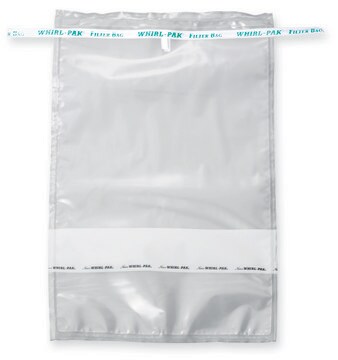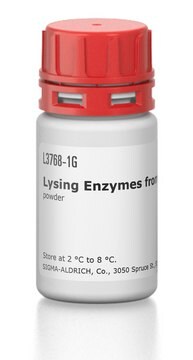추천 제품
생물학적 소스
mouse
Quality Level
결합
unconjugated
항체 형태
purified antibody
항체 생산 유형
primary antibodies
클론
nSyn14, monoclonal
분자량
calculated mol wt 14.46 kDa
정제법
using protein G
종 반응성
human, mouse
포장
antibody small pack of 100 μL
기술
ELISA: suitable
immunohistochemistry (formalin-fixed, paraffin-embedded sections): suitable
western blot: suitable
동형
IgG1κ
에피토프 서열
N-terminal half
단백질 ID 수납 번호
UniProt 수납 번호
배송 상태
ambient
타겟 번역 후 변형
mutation (Tyr39)
유전자 정보
human ... SCNA(6622)
일반 설명
Alpha-synuclein (UniProt: P37840; also known as Non-A beta component of AD amyloid, Non-A4 component of amyloid precursor, NACP) is encoded by the SNCA (also known as NACP; PARK1) gene (Gene ID: 6622) in human. α-synuclein is abundantly expressed in the brain and is found in a classic amyloid fibril form within the intra-neuronal Lewy body deposits of Parkinson′s disease brains. In its monomeric form it participates in synaptic vesicle exocytosis by enhancing vesicle priming, fusion and dilation of exocytotic fusion pores. It acts by increasing local calcium release from microdomains, which is essential for the enhancement of ATP-induced exocytosis. In its multimeric form it acts as a molecular chaperone assisting in the folding of synaptic fusion components called SNAREs at presynaptic membrane. It is also shown to regulate dopamine release and transport. It reduces neuronal responsiveness to various apoptotic stimuli, leading to a decreased caspase-3 activation. Post-translationally it can be phosphorylated, predominantly on serine residues. Phosphorylation of serine 129 is reported to be selective and extensive in synucleinopathy lesions. In addition, increased phosphorylation of Tyr125, nitration of Tyr39, and glycation of α-synuclein have been reported in Parkinsons disease subjects. Nitration of tyrosine residues in α-synuclein is observed in the signature inclusions of Parkinsons disease, dementia with Lewy bodies, the Lewy body variant of Alzheimer s disease, and multiple system atrophy brains. EAAC1 -/- mice display age-dependent loss of dopaminergic neurons in the substantia nigra pars compacta and this neuronal loss is accompanied by increased nitrosylated α-synuclein and microglial activation. Genetic alterations of SNCA gene are reported to result in aberrant polymerization into fibrils, which is associated with several neurodegenerative diseases (synucleinopathies). (Ref.: Miranda, HV., et al. (2017). Sci. Rep. 7; 13713; Berman, AE., et al. (2011). Ann. Neurol. 69(3); 509 520; Giasson, BI., et al. (2000). Science. 290(5493); 985-989).
특이성
Clone nSyn14 is a mouse monoclonal antibody that detects a/b synuclein nitrated at tyrosine 39.
면역원
Full-length recombinant human α-synuclein nitrated at tyrosine 39.
애플리케이션
Anti-nitro-α/β-Synuclein (Tyr39), clone nSyn14, Cat. No. 36-012-I, is a mouse monoclonal antibody that detects α/β-Synuclein nitrated on tyrosine 39 and is tested for use in ELISA, Immunohistochemistry, and Western Blotting.
Isotype testing: Identity Confirmation by Isotyping Test.
Isotyping Analysis: The identity of this monoclonal antibody is confirmed by isotyping test to be mouse IgG1.
Tested Applications
ELISA Analysis: A representative lot detected nitro- α/β-Synuclein (Tyr39) in ELISA applications (Giasson, B.I., et al. (2000). Science. 290(5493):985-9).
Immunohistochemistry Analysis: A representative lot detected nitro- α/β-Synuclein (Tyr39) in Immunohistochemistry applications (Maki, R.A., et al. (2019). Free Radic Biol Med. 141:115-140; Giasson, B.I., et al. (2000). Science. 290(5493):985-9).
Western Blotting Analysis: A 1:500 dilution from a representative lot detected nitro- α/β-Synuclein in Various a-synuclein protein samples (chemically nitrated or untreated) (Courtesy of Sarah Wright, Nitrome Biosciences, Inc., Brisbane, CA USA).
ELISA Analysis: Various dilutions of this antibody detected nitro- α/β-Synuclein in various a-synuclein protein samples (chemically nitrated or untreated) (Courtesy of Sarah Wright, Nitrome Biosciences, Inc., Brisbane, CA USA). .
Western Blotting Analysis: A representative lot detected nitro- α/β-Synuclein (Tyr39) in Western Blotting applications (Miranda, H.V., et al. (2017). Sci Rep. 7(1):13713; Fernandez, E., et al. (2014). Antioxid Redox Signal. 21(15):2143-8; Hung, L.W., et al. (2012). J Exp Med. 209(4):837-54; Giasson, B.I., et al. (2000). Science. 290(5493):985-9).
Note: Actual optimal working dilutions must be determined by end user as specimens, and experimental conditions may vary with the end user
Isotyping Analysis: The identity of this monoclonal antibody is confirmed by isotyping test to be mouse IgG1.
Tested Applications
ELISA Analysis: A representative lot detected nitro- α/β-Synuclein (Tyr39) in ELISA applications (Giasson, B.I., et al. (2000). Science. 290(5493):985-9).
Immunohistochemistry Analysis: A representative lot detected nitro- α/β-Synuclein (Tyr39) in Immunohistochemistry applications (Maki, R.A., et al. (2019). Free Radic Biol Med. 141:115-140; Giasson, B.I., et al. (2000). Science. 290(5493):985-9).
Western Blotting Analysis: A 1:500 dilution from a representative lot detected nitro- α/β-Synuclein in Various a-synuclein protein samples (chemically nitrated or untreated) (Courtesy of Sarah Wright, Nitrome Biosciences, Inc., Brisbane, CA USA).
ELISA Analysis: Various dilutions of this antibody detected nitro- α/β-Synuclein in various a-synuclein protein samples (chemically nitrated or untreated) (Courtesy of Sarah Wright, Nitrome Biosciences, Inc., Brisbane, CA USA). .
Western Blotting Analysis: A representative lot detected nitro- α/β-Synuclein (Tyr39) in Western Blotting applications (Miranda, H.V., et al. (2017). Sci Rep. 7(1):13713; Fernandez, E., et al. (2014). Antioxid Redox Signal. 21(15):2143-8; Hung, L.W., et al. (2012). J Exp Med. 209(4):837-54; Giasson, B.I., et al. (2000). Science. 290(5493):985-9).
Note: Actual optimal working dilutions must be determined by end user as specimens, and experimental conditions may vary with the end user
물리적 형태
Purified mouse monoclonal antibody IgG1 in buffer containing 0.1 M Tris-Glycine (pH 7.4), 150 mM NaCl with 0.05% sodium azide.
저장 및 안정성
Recommend storage at +2°C to +8°C. For long term storage antibodies can be kept at -20°C. Avoid repeated freeze-thaws.
기타 정보
Concentration: Please refer to the Certificate of Analysis for the lot-specific concentration.
면책조항
Unless otherwise stated in our catalog or other company documentation accompanying the product(s), our products are intended for research use only and are not to be used for any other purpose, which includes but is not limited to, unauthorized commercial uses, in vitro diagnostic uses, ex vivo or in vivo therapeutic uses or any type of consumption or application to humans or animals.
적합한 제품을 찾을 수 없으신가요?
당사의 제품 선택기 도구.을(를) 시도해 보세요.
Storage Class Code
12 - Non Combustible Liquids
WGK
WGK 1
Flash Point (°F)
Not applicable
Flash Point (°C)
Not applicable
시험 성적서(COA)
제품의 로트/배치 번호를 입력하여 시험 성적서(COA)을 검색하십시오. 로트 및 배치 번호는 제품 라벨에 있는 ‘로트’ 또는 ‘배치’라는 용어 뒤에서 찾을 수 있습니다.
자사의 과학자팀은 생명 과학, 재료 과학, 화학 합성, 크로마토그래피, 분석 및 기타 많은 영역을 포함한 모든 과학 분야에 경험이 있습니다..
고객지원팀으로 연락바랍니다.